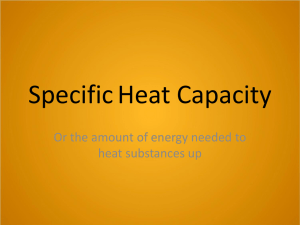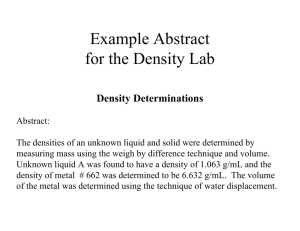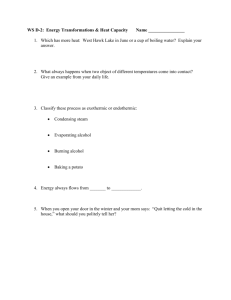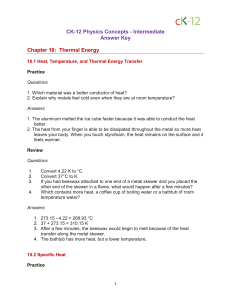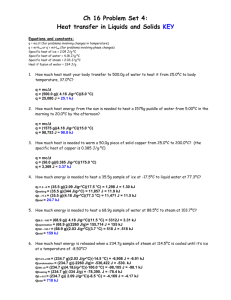specific heat
advertisement
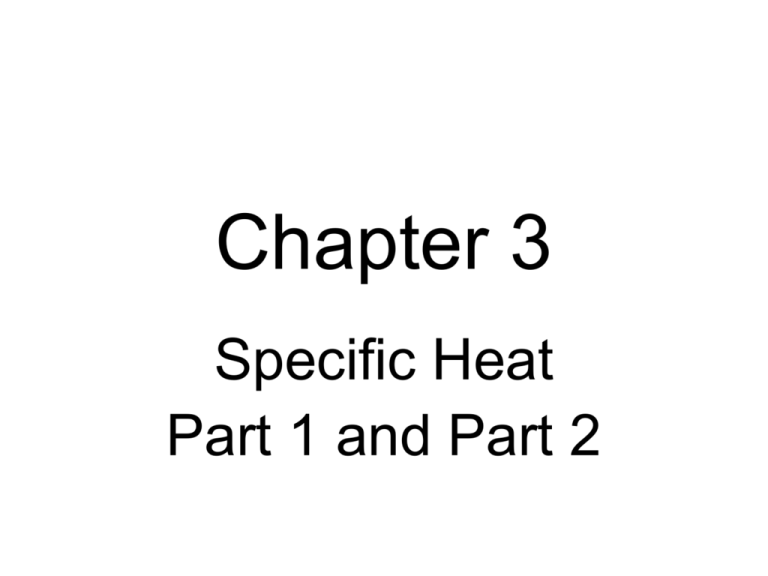
Chapter 3 Specific Heat Part 1 and Part 2 Specific Heat • Different substances require different amounts of heat to change their temperature. • In general the specific heat of a substance indicates how hard something is to heat up or cool down. • Scientifically speaking the specific heat is the amount of heat required to change the temperature of 1 gram of a substance by 1ºC. •Which substance is the easiest to heat up or cool down? → •Which substance is the easiest to heat up or cool down? •Which substance is the hardest to heat up or cool down? → •Which substance is the hardest to heat up or cool down? → •Which substance is the hardest to heat up or cool down? •How might we observe the high specific heat of water? “Flying Freddie Spooner” 2014 Tri-Valley Cannonball Champion → •Scientific interpretation of the specific heat of water. The specific heat of water • The specific heat of water is 4.184 J/g•ºC. • To simplify our discussion we will round this to 4 J/g•ºC. The specific heat of water • If we have one gram of water at 25ºC and we add 4J of energy to it what will the temperature be? • Answer: 26ºC The specific heat of water • If we have two grams of water at 30ºC and we remove 16J of energy from it what will the temperature be? • Answer 28ºC The specific heat of water • The high specific heat of water has many implications to our everyday lives. Importance of Water’s High Specific Heat • Maintenance of Body Temperature Importance of Water’s High Specific Heat • Heat Storage on a Larger Scale. Importance of Water’s High Specific Heat • Temperature fluctuations that permit life. Homework Worksheet Chapter 3 – 2 (due tomorrow) Study Guide Chapter 3 (due Friday) How Much Heat? • I want to heat some water. • What do I need to know in order to determine the amount of heat required? • Mass of water. • Temperature Change • Specific Heat of Water H = m ∆T Cp Heat = (mass) x (change in temperature) x (specific heat) Kilojoules • kilo (k) = 1000 • kJ = 1000 J • 4.08 kJ = 4080 J •How much heat is necessary to heat 258g of water from 25.0ºC to 100.0ºC? (258g)(75.0ºC)(4.184J/gºC) = 80,960.4J = 81,000J = 81.0 kJ •How much heat must be removed to cool 1058g of copper from 325.0ºC to 18.0ºC? (1058g)(307.0ºC)(0.385J/gºC) = 125,050J = 125,000J = 125 kJ How “much” water do I have? 52.8 ml = 52.8 cm3 or 52.8 g • The mass of an unknown metal is 14.9 g. It is heated to 100.0C and dropped into 75.0 mL of water at 20.0C. The final temperature of the system is 28.5C. What is the specific heat of the metal? • The mass of unknown metal is 17.19 g. It is heated to 100.00C and dropped into 25.00 mL of water at 24.50C. The final temperature of the system is 30.05C. What is the specific heat of the metal? Heat gained by the water = Heat lost by the metal m ∆T Cp = m ∆T Cp (25.00g)(5.55°C)(4.184 J/g C) = (17.19g)(69.95°C)(x) C p of metal = q m x DT = 580.53J o (17.19g )(69.95 C) Cp = 0.4828 J/g · °C = 0.48279 J g oC Homework Worksheet Chapter 3 – 3 (due tomorrow) Study Guide Chapter 3 (due Thursday)
